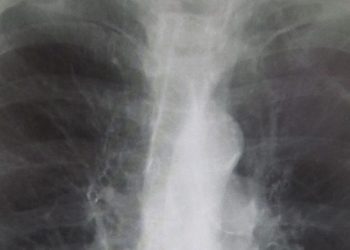Beta-lactam monotherapy may be inferior to combination therapy in pneumonia
1. In Switzerland, patients who were hospitalized with pneumonia and treated with beta-lactam antibiotic monotherapy did not fare as well as those treated with beta-lactam and macrolide combination antibiotic therapy.
2. Further analysis showed that combination antibiotic therapy was perhaps better than monotherapy, especially in patients with a more severe pneumonia. However, further research would be needed to determine if therapy can indeed be tailored based on the severity of pneumonia.
Evidence Rating Level: 1 (Excellent)
Study Rundown: Community-acquired pneumonia is responsible for a high burden of disease worldwide, especially in the elderly. Antibiotic therapy for those hospitalized with this disease has varied because of lack of evidence to support any one regimen. European guidelines advocate for beta-lactam therapy alone, whereas North American guidelines favor a combination of beta-lactam with a macrolide (the latter is for the coverage of atypical pneumonia organisms, such as Legionella species, Mycoplasma pneumoniae, and Chlamydia pneumoniae). Due to the many drawbacks of over-using antibiotics, this study was conducted to determine whether patients hospitalized with pneumonia fare as well with beta-lactam monotherapy compared to the combination of beta-lactam with a macrolide.
The results suggested that beta-lactam monotherapy may not be as effective as combination therapy. Further analysis showed that combination therapy was perhaps better than monotherapy, especially in patients with more severe pneumonia. However, further research would be needed to determine if therapy can indeed be tailored based on the severity of pneumonia. The major strength of this study was that it was a randomized trial. However, the lack of blinding could have biased the data and interpretation. In addition, since the study was conducted in Switzerland, and antibiograms vary across different parts of the world, the results may have limited generalizability to other regions of the world.
Click to read the study, published today in JAMA Internal Medicine
Relevant Reading: β-Lactam/macrolide dual therapy versus β-lactam monotherapy for the treatment of community-acquired pneumonia in adults: a systematic review and meta-analysis
In-Depth [randomized controlled trial]: This study was conducted across six hospitals in Switzerland from 2009 to 2013. The inclusion criteria were adults who had clinical findings of pneumonia along with chest x-ray evidence to support that diagnosis. The allowed beta-lactams included cefuroxime or amoxicillin and clavulanic acid, and the macrolide used was clarithromycin. The primary outcome was number of days to reach clinical stability, as determined by vital signs data. Secondary outcomes included 30- and 90-day mortality, length of stay, transfer to the ICU, need for another antibiotic, re-admission, recurrence of pneumonia, and requirement for chest tube placement or thoracic surgery.
A total of 580 patients were included in the final analysis. After seven days of therapy, the primary outcome was not reached in 41.2% of patients in the monotherapy group, compared to 33.6% in the combination therapy group (absolute difference 7.6%; upper limit of 90%CI 13%). This did not meet the criteria to establish non-inferiority. There was no significant difference identified in the two arms for any secondary outcomes. In subgroup analysis that examined outcomes based on severity of the pneumonia (as determined by Pneumonia Severity Index class and CURB65 score), there was a trend towards better outcomes with combination antibiotic therapy. The outcomes for those who had documented atypical pathogen infection were better in the combination therapy arm compared to the monotherapy arm (HR of reaching clinical stability 0.33; 95%CI 0.13-0.85).
More from this author: Percutaneous intervention outcomes for STEMI similar for women and men, Mechanical aortic valve replacement linked with increased early mortality, Proton pump inhibitor boluses as effective as infusions in ulcer bleeds, Intensity of medical residency may affect future practice style, Coronary angiography in asymptomatic patients may lead to inappropriate percutaneous interventions
Image: PD
©2012-2014 2minutemedicine.com. All rights reserved. No works may be reproduced without expressed written consent from 2minutemedicine.com. Disclaimer: We present factual information directly from peer reviewed medical journals. No post should be construed as medical advice and is not intended as such by the authors, editors, staff or by 2minutemedicine.com. PLEASE SEE A HEALTHCARE PROVIDER IN YOUR AREA IF YOU SEEK MEDICAL ADVICE OF ANY SORT.







